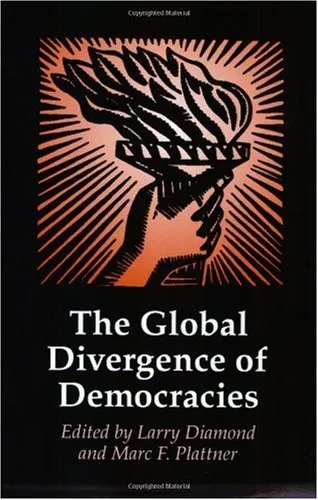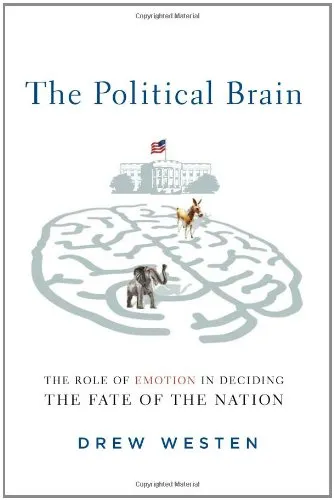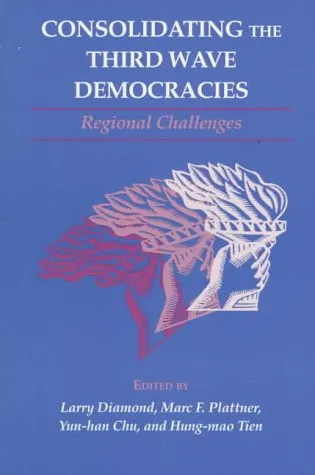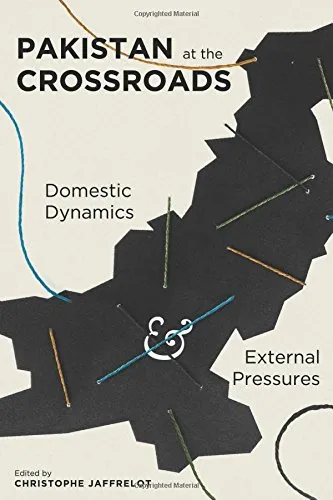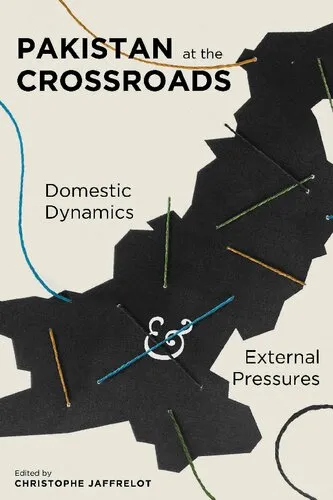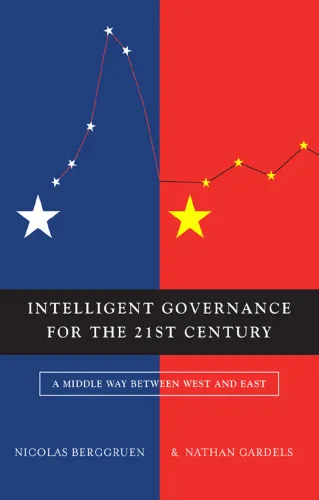The Global Divergence of Democracies (A Journal of Democracy Book)
4.0
بر اساس نظر کاربران

شما میتونید سوالاتتون در باره کتاب رو از هوش مصنوعیش بعد از ورود بپرسید
هر دانلود یا پرسش از هوش مصنوعی 2 امتیاز لازم دارد، برای بدست آوردن امتیاز رایگان، به صفحه ی راهنمای امتیازات سر بزنید و یک سری کار ارزشمند انجام بدینکتاب های مرتبط:
معرفی کتاب «The Global Divergence of Democracies»
کتاب The Global Divergence of Democracies به ویراستاری دکتر لری دایموند و دکتر مارک اف. پلاتنر، یکی از برجستهترین آثار در حوزه دموکراسی معاصر محسوب میشود. این اثر که در مجموعه A Journal of Democracy Book جای گرفته، نگاهی دقیق و عمیق به روند تکامل و چالشهای پیش روی دموکراسی در اقصی نقاط جهان دارد. کتاب سعی دارد نشان دهد که چگونه تجربیات گوناگون ملتها، منجر به یک شکاف جهانی در حوزۀ دموکراسی شده است. این بررسی جامع، دادهها، تحلیلها و دیدگاههای مختلفی را از اندیشمندان برجسته ارائه داده و به فرآیندهای سیاسی در کشورها و مناطق مختلف میپردازد.
خلاصه تفصیلی از کتاب
این کتاب از مجموعهای از مقالات و تحلیلهای ممتاز تشکیل شده که ریشه در مجله معتبر Journal of Democracy دارد. هدف اصلی این اثر، تحلیل بازه زمانی اخیر در تاریخ سیاسی است که در آن شاهد رشد دموکراسی در برخی مناطق و کاهش یا حتی افول آن در بخشهای دیگر جهان بودهایم. ویراستاران این کتاب به بررسی پیچیدگیهای فراگیری دموکراسی در نقاط مختلف جهان میپردازند و در عین حال چالشهایی همچون اقتدارگرایی نوین، فساد سیاسی و پوپولیسم را برجسته میسازند.
کتاب در چندین بخش مهم تدوین شده است که هرکدام گویای ابعاد مختلفی از دموکراسی معاصر هستند. در این میان، موضوعاتی چون گسترش دموکراسی، بازگشت اقتدارگرایی، دموکراسیهای شکننده، و تأثیر انقلاب تکنولوژی بر سیاست و آزادیهای مدنی بررسی میشوند. نویسندگان مقالات ارائهشده در این کتاب از برجستهترین متخصصان و پژوهشگران حوزه دموکراسی هستند و هر مقاله با دیدگاهی مستقل، اما در چارچوب کلی کتاب، نقشی منحصربهفرد در پیشبرد بحثها ایفا میکند.
نکات کلیدی
- شکاف جهانی بین دموکراسیهای باثبات و دموکراسیهای شکننده.
- تأثیرات جهانیشدن و انقلاب دیجیتال بر سیاست و حکمرانی.
- بازگشت برخی رژیمهای اقتدارگرا در برابر هنجارهای دموکراتیک.
- تحلیل نقش نهادهای مدنی و سازمانهای بینالمللی در حمایت از دموکراسی.
- بررسی شکلگیری جنبشهای پوپولیستی و تأثیر آنها بر ارزشهای دموکراتیک.
جملات معروف از کتاب
«دموکراسی هرگز تضمینشده نیست؛ برای حفظ و تقویت آن به یک تلاش مداوم نیاز است.»
«چالش اصلی دموکراسی، تطابق یافتن با تغییرات سریع دنیای معاصر است.»
«اقتدارگرایی جدید میتواند در زیر لوای نهادهای دموکراتیک پنهان شود، اما هدفی جز فرسایش این نهادها ندارد.»
چرا این کتاب اهمیت دارد؟
در عصری که شاهد تحولاتی بنیادین در سیاست، اقتصاد و جامعه جهانی هستیم، کتاب The Global Divergence of Democracies یک منبع بینظیر برای درک بهتر جهان و جایگاه دموکراسی در آن محسوب میشود. این اثر، نه تنها نگرشی آکادمیک و تحلیلی ارائه میدهد، بلکه به سیاستمداران، دانشجویان، اساتید دانشگاه و علاقهمندان به سیاست جهانی کمک میکند تا چالشهای پیش روی جهان دموکراتیک را بهتر درک کنند.
با تحلیل ویژهای که این کتاب از شکافهای دموکراتیک ارائه میدهد، میتوان متوجه شد که دموکراسی، علیرغم مشکلات و موانع، همچنان یک نظام سیاسی پیشرو و مطلوب است. خواندن این کتاب برای کسانی که در پی یافتن راهحلهایی برای تقویت دموکراسیها و مقابله با بحرانهای نوظهور هستند، ضروری است.
Introduction to "The Global Divergence of Democracies"
"The Global Divergence of Democracies" is a thought-provoking compilation of essays and analyses, brought together by renowned scholars Dr. Larry Diamond and Dr. Marc F. Plattner. As part of the influential "Journal of Democracy Book" series, this volume delves deep into the current state, challenges, and trajectories of democracy across the globe at the turn of the 21st century. It offers an incisive examination of the political trends that have shaped and continue to redefine democratic values and practices in different parts of the world.
The book comes at a pivotal moment when global democracy stands at a crossroads. It explores themes such as the resurgence of authoritarianism, the varying paths taken by democratizing nations, and the enduring question of how democracy can be sustained in increasingly complex and volatile environments. More than just an academic endeavor, it is an urgent call to understand and address the forces threatening democratic ideals today.
Detailed Summary of the Book
Spanning multiple regions and time periods, this collection of essays provides a rich and nuanced understanding of why democracies flourish in some contexts while struggling or outright failing in others. The contributors—a diverse group of experts—analyze the evolution of democracy in developing and established nations alike, offering perspectives that are as varied as the political landscapes they examine.
The book is structured to emphasize both the promise and the perils of democratic governance. In its initial chapters, the authors explore the optimistic wave of democratic transitions during the late 20th century, where countries from South America to Eastern Europe shook off authoritarian regimes. However, as the narrative unfolds, attention shifts toward the challenges facing these newly democratic states, including political corruption, economic instability, and weak institutions.
A significant section is also devoted to the "authoritarian resurgence" seen in countries such as Russia and China, where democracy’s appeal has waned or been deliberately stifled. The book provides a detailed study of how authoritarian models have adapted, evolved, and even posed themselves as alternatives to Western liberal democracy. Furthermore, issues like globalization, digital technology, and the role of civil society are discussed in the context of their impact on democratic practices.
Ultimately, "The Global Divergence of Democracies" does not just chart the successes and failures of democracy but also fosters a deeper understanding of how context, culture, and history influence political trajectories. It invites readers to engage critically with the question of why democracy is diverging along such starkly different paths globally.
Key Takeaways
- The global wave of democratization that started in the late 20th century has stagnated, giving way to a "democratic recession."
- Authoritarian regimes are becoming increasingly sophisticated, using technology and state apparatus to suppress dissent and challenge democratic ideals.
- Democracy is not monolithic; its practices and success depend on historical, cultural, and economic contexts.
- Civil society, media freedom, and robust institutions remain critical safeguards of democratic governance.
- Globalization and the digital revolution present opportunities and risks for the spread of democratic values.
Famous Quotes from the Book
"Democracy does not progress in a straight line; it ebbs and flows, advancing in one era and struggling to survive in the next."
"Authoritarian regimes rarely fall in isolation; their collapse often reverberates through entire regions, inspiring hope and courage among the oppressed."
"A free and vibrant civil society is not a luxury in a democracy—it is its oxygen."
Why This Book Matters
"The Global Divergence of Democracies" is more than just a chronicle of democracy’s triumphs and setbacks. It is a vital resource for policymakers, academics, activists, and anyone interested in the future of democratic governance. In an era of growing authoritarian entrenchment and democratic decay in various parts of the globe, the book serves as both a warning and a guide. It underscores the need for vigilance, adaptability, and a commitment to core democratic principles.
By highlighting the factors contributing to democracy’s global divergence, the book provides a roadmap for understanding and addressing the obstacles to its consolidation. Its blend of theoretical rigor and practical insight makes it an indispensable addition to the literature on democracy, offering lessons crucial for safeguarding freedom in the 21st century.
Whether you are a student of political science, a concerned global citizen, or a practitioner in the field of international relations, this book equips you with the tools to grasp the complexities of today’s democratic struggles.
دانلود رایگان مستقیم
شما میتونید سوالاتتون در باره کتاب رو از هوش مصنوعیش بعد از ورود بپرسید
دسترسی به کتابها از طریق پلتفرمهای قانونی و کتابخانههای عمومی نه تنها از حقوق نویسندگان و ناشران حمایت میکند، بلکه به پایداری فرهنگ کتابخوانی نیز کمک میرساند. پیش از دانلود، لحظهای به بررسی این گزینهها فکر کنید.
این کتاب رو در پلتفرم های دیگه ببینید
WorldCat به شما کمک میکنه تا کتاب ها رو در کتابخانه های سراسر دنیا پیدا کنید
امتیازها، نظرات تخصصی و صحبت ها درباره کتاب را در Goodreads ببینید
کتابهای کمیاب یا دست دوم را در AbeBooks پیدا کنید و بخرید
1380
بازدید4.0
امتیاز0
نظر98%
رضایتنظرات:
4.0
بر اساس 0 نظر کاربران
Questions & Answers
Ask questions about this book or help others by answering
No questions yet. Be the first to ask!
